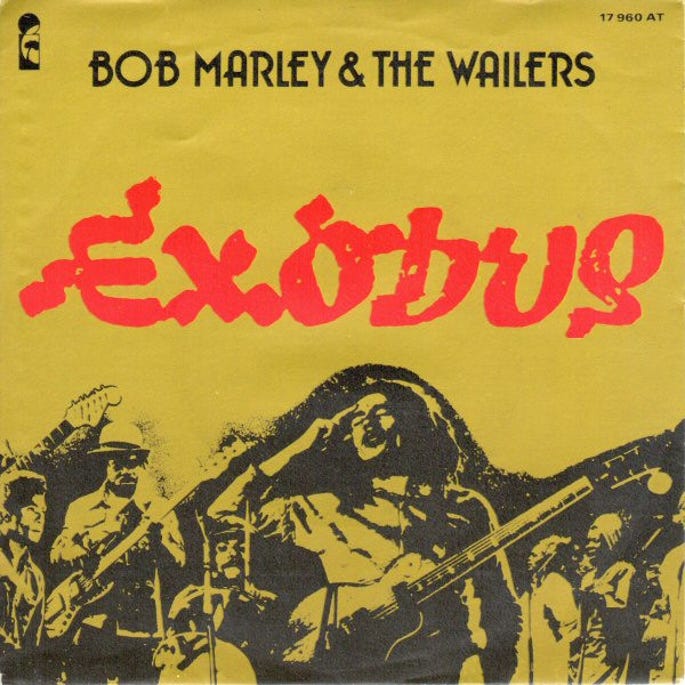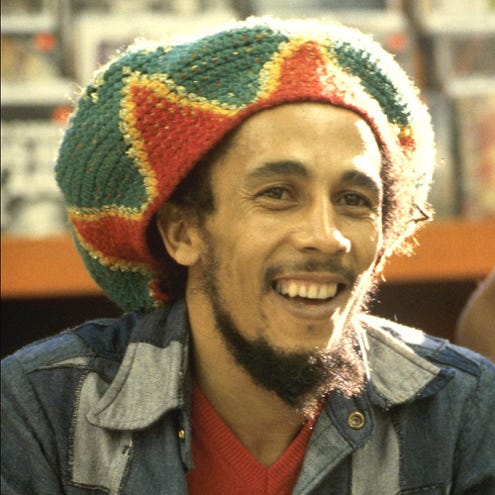The magnanimity and triumph of our human spirit is exemplified in Bob Marley
From poverty he became an international phenomenon, yet his only desire was to see mankind live together in harmony
On my recent travels back from The Philippines, I had almost given up on the possibility of finding a film to my taste among the airline offerings. Then, lo and behold, I found a gem.
So beautifully directed by Kevin McDonald, I found this documentary on the life of Robert Nesta Marley. And what an inspirational story. If you haven’t seen it, I highly recommend it (available to view here).
Marley grew up in beautiful rural St Ann’s in Jamaica. The romantic beauty of these natural surroundings contrasted starkly with him having no shoes and frequently going to bed hungry. Seduced by a white man by the name of Norval Marley, his single mother struggled to support him, moving with Bob to Trenchtown when he was 12. A ghetto replete with gangs and guns, the shy young man transcended physical hardships, fatherlessness and racial discrimination (due to his mixed-race parentage) through his love of the guitar.
A formidable work ethic forged through hardship, his love for humanity, and his commitment to God, his only desire was to see mankind live together and he clearly knew he could make this happen. He almost did. However, sadly at the age of 36 he was diagnosed with a recurrence of a cancer on his toe and died before his time.
Originally considered to be unfortunate, recent confessions of a CIA assassin have disclosed that Marley may have died through disease caused by a carcinogenic poison instilled in a pair of trainers gifted to him.
I was 13 years old when I first came across his music and was instantly a fan. My father however, did not like it one bit. When I borrowed his album ‘Exodus’ from a friend, it was instantly banned from the household.
I’ve never been sure whether my father’s attitude was simply because he didn’t want me listening to the music of a black man, or because living in peace and harmony, uniting people around love and common ideals, was a challenging notion in apartheid South Africa. The lyrics and laid-back rhythm perhaps threatened my father’s innate totalitarian programming. My mother was a different story. She couldn’t help but boogie in the kitchen with a smile to the uplifting reggae beat, even when she felt perhaps she shouldn’t.
Rastafarians vested faith in Haile Selassie, who in fact had a house in my home town, Bath in the UK, for a period – now a museum of Rastafarianism. The parochial Georgian city of Bath is a rather unexpected place for such a museum.
Bob and other Rastas believed that Selassie represented the return of Jesus Christ as a black man. However, I suspect if anyone embodied the spirit and moral teachings of Christ, it was Bob Marley through his socially conscious and empowering lyrics. In these times, the spirit of Jesus certainly needs to be creative to make an impact. And no musician has made as great an impact on all cultures, creeds and races as Bob Marley, ever.
Bob Marley exemplifies the triumph of the human spirit, the way we can overcome any and all adversity for the higher good.
He was a true philanthropist and his music has the capacity to bring mankind together now. Indeed, it was written for the now.
I love music and have enjoyed a wide variety of music in my life, from classical to jazz to folk music to heavy metal and rock. Generally, I’ve found that all music has a place and time – that is, until recently.
Popular music has become increasingly degenerate, with satanistic imagery, depraved lyrics, discordant sounds, immoral gesticulations and worse. If you’ve had the misfortune to have seen/heard Sam Smith’s music you will know what I mean. This is not just a ‘generation gap’ issue. If one believes as I do, that what we say, think, see and do (including singing) contributes positively or negatively to our wellbeing, it is no wonder so many in the popular culture are so lost and down in the dumps.
Music rhythm and frequency is very relevant to our wellbeing – we all know what happy music sounds like and conversely what sad music sounds like. Reggae’s rhythm is similar to that of our own heartbeat and the heartbeat of our mother. It speaks to our hearts, whether our minds hear the lyrics or not.
Bob combined unique reggae rhythms with profound, life-affirming and transformation-inducing lyrics inspired by God and to prepare humanity for this time. If he were here now, I truly feel we would not have got to this point of depravity – he was doing such a great job in realising his dream of unifying people with his inspirational musical messages. During Bob Marley and the Wailers’ penultimate tour of Europe, they sang to around 2 million people in the space of six weeks, spreading their message of unity, love and gratitude to God.
The film contains many poignant testimonies from friends and family, including how difficult it must have been for his children when he had gifted himself to the people. Demonstrating a global consciousness, in a 1978 interview three years before he died, Marley said:
“My life is only important if I can help plenty people. Otherwise my life is not important.”
After living in London for several years, he returned to Jamaica during intense civil war, responding to a request to help unify the warring factions. On stage, the magnitude of his power was manifest; from humble roots to magnificent, he spontaneously called the leaders of the warring parties onto the stage, and held their hands together.
The united and dancing throngs cheered as the leaders shook hands. Only Bob could have done this. Such is the power of his music, the power of his personality, and the power of his love.
He embodied integration and his gift was being able to bring people together. As his girlfriend put it, “he was half uptown, half downtown, half black , half white; it’s that marriage of everything, he just embodied it in one person.”
A unique, integrated, and united human being. The antithesis of polarisation and separation, which forms the framework of our current existence.
In one of his most memorable songs, Redemption Song, so relevant to today, he sang “How long shall they kill our prophets while we stand aside and look?”
With the recent albeit discredited confessions of CIA assassin Bill Oxley, I intuitively feel that the assassin is telling the truth – why would he lie? Bob was a prophet and his words were prophetic.
He knew what was coming. He knew this was coming. And he knew there was and still is a better way. If you listen carefully now, you’ll hear him singing.
Please help support our work!
If you enjoy this Substack and have the means, please consider making a donation - all proceeds go to World Council for Health. You can either:
Can’t donate but would like to contribute? We are always looking for volunteers, so please do get in touch!







Thank you Tess, that was a lovely article. Like you, I just despair of modern trash 'entertainment'. I have to confess I didn't really know anything much about Bob Marley, so thanks again for opening my eyes.
'Reggae’s rhythm is similar to that of our own heartbeat and the heartbeat of our mother. It speaks to our hearts, whether our minds hear the lyrics or not.' I love this and love his music even more now! Great article and sadly not surprised at the CIA assassin's conclusion.